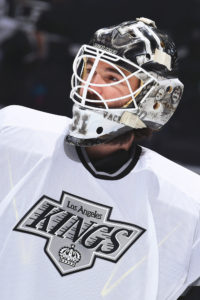
Juan Ocampo/NHLI
This season: 3,030 minutes, 27-20-3 record, 2.12 goals-against average, .917 save percentage, .925 even strength save percentage, 7 shutouts (with Los Angeles), 3,309 minutes, 30-21-3 record, 2.18 goals-against average, .915 save percentage, .924 even strength save percentage, 7 shutouts (total)
The good: Peter Budaj entered the year as the third string goalie, cleared waivers at the beginning of the season, was recalled after one game, and when he appeared in the third game of the season, replacing Jeff Zatkoff for the third period in Minnesota, he made his first of 53 appearances in 58 games, a stretch of consistency that began with 23 consecutive appearances. Again, this was Budaj, who had appeared in one NHL game in the previous two seasons and endured a season in which he went winless over 19 AHL appearances with St. John’s in 2014-15, who turned goaltending into a modest L.A. strength despite questionable depth and a younger defense than in years past. Narrowly missing out on an All-Star invite, Budaj did exactly what was asked of him and kept a Kings team in position to content for a playoff spot as two-thirds of the Holy Trinity were sidelined due to injury or scuffling through a challenging season. There’s not much more that needs to be said. The team ultimately ran out of juice and buy-in at the end of a season-long stressful, uphill battle, but the humble Budaj, the son of an anesthesiologist and a pediatrician, provided a bright spot in a disappointing season by contributing some of the best minutes of his career and keeping the team in position to contend for a playoff spot. “He had an opportunity to come in and he’s kind of seized that opportunity and taken control of it and he’s played really well for us,” Dustin Brown said in February. “It’s just one of those things you like to see. You can talk about guys getting hurt and it’s hard to see a guy like Quickie get hurt for us but he’s come in and been key for us.”
The bad: Darryl Sutter repeatedly called on his players to maximize their skill sets, and Budaj probably did that to a greater degree than any other King in 2016-17, so there’s not a ton to write here. There were low moments that all goalies go through, and Sutter was hard on Budaj and prodded him with messages embedded in pointed postgame comments, but any temporary drop in his game was likely tied to some extreme usage during his 34-year-old season, a balance that was necessary because of Zatkoff’s struggles. Though Sutter noted in January that Budaj was “a better goalie at home than he has been on the road,” he finished with clear inverse splits with Los Angeles, going 1.95/.928 on the road and 2.31/.903 at home. It should also be noted that the team played tight, structured hockey around him, with both Dean Lombardi and Bill Ranford noting that the Kings’ allowance of Grade-A chances hit a five-year low prior to the team’s late-season slump. “We’ve seen this before that when sometimes an injury goes down, it forces you to do some other things better than maybe you would have otherwise, and I talk about the chances, too,” Lombardi said the day the team acquired Ben Bishop. Just before the end of his Kings tenure, team management was becoming miffed with the soft goals that Budaj allowed, but given the pressure on those atop the organization amidst the mid-season pressure cooker, their frustration is understandable, even if it doesn’t align with the success the goalie forged during his remarkable, if brief, Kings tenure.
Going forward: Budaj signed a two-year contract extension with Tampa Bay this off-season with a $1.025 average annual value. His turnaround from an experienced veteran, to someone unable to win an AHL game, to receiving a Kings PTO, to AHL All-Star, to borderline NHL All-Star has been a pleasure to cover, and the 2016-17 season served as welcome redemption for someone who was stung by clearing waivers after failing to not make Los Angeles out of training camp. The best of luck to “Boods.”
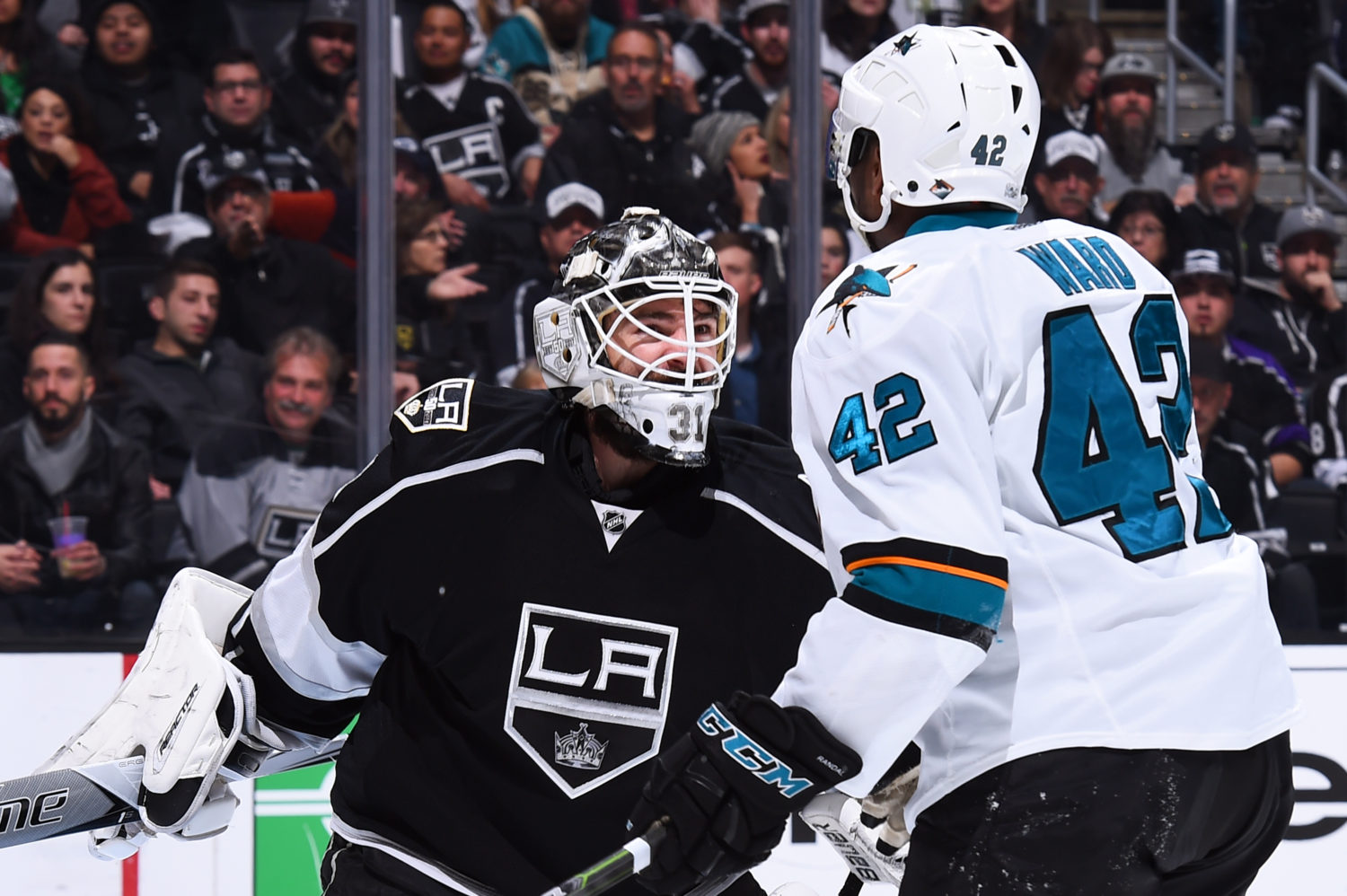
Juan Ocampo/NHLI

Andrew D. Bernstein/NHLI
This season: 931 minutes, 8-5-2 record, 2.26 goals-against average, .917 save percentage, .925 even strength save percentage, 2 shutouts
The good: Jonathan Quick returned from injury in late February and started 16 games over the remainder over the remainder of the season, limiting his opponents to two goals or fewer in 12 of those starts. When allowing three or more goals, the Kings went 1-1-1. He put his team in position to win and upon his return added an extra emotional spark inherent in his advanced leadership position, though his emotion and the team’s collective will didn’t lead to a playoff berth. Even though Quick’s 2016-17 numbers were in the ballpark of his career marks, it’s not really worth putting much stock in them when the team ran out of gas late in the season and their buy-in appeared to dissipate. Despite this, the eye test still indicated Quick was really good on most nights after his return. His ability to play the puck behind the net and away from the crease – a clear rough spot for him earlier in his career – has noticeably improved over the last two seasons.
The bad: I’m not sure if there’s really a sample size large enough to weigh in on this, other than his two or three suspect games this season. Rather, there’s the larger-scale view that as much as he means to the Kings, the team didn’t exactly take off after his emotional return. And though he was mostly very good after his return, his numbers were essentially similar to Budaj’s. But as far as the 2016-17 season goes, there’s not a ton to add here, other than the fact that he wasn’t available between the second and 61st games of the season.
Going forward: Quick suffered his second major groin injury in four seasons, and having undergone back and wrist surgery this decade, it’s worth mentioning that he’s 31 years old and will be on the books for $5.8-million over the next six seasons. That shouldn’t be of primary focus in the immediate future, as there hasn’t yet been anything to suggest that Quick is about to break sharply from his status quo. There are the familiar notes: his save percentage was above-average, and his even strength save percentage tied for 20th among the 63 goalies who appeared in at least 10 games. There is a (bogus) criticism of Quick that he has disproportionately benefited from Los Angeles’ airtight systems adherence and top-notch defensive play, but that argument has taken on some water as the blue line and team depth have been hit hard by age and defection over the last three seasons and Quick has essentially maintained his numbers. There has also been a needed push recently by hockey sabermetricians to formulate better tools for evaluating goaltenders, and I’ll always listen when someone listed on this page is speaking, even if I don’t always agree. But such stats for goalies do not rely on a wide enough breadth of evaluative tools as skaters’ advanced stats, making such gauges too reliant on the few available stats such as expected save percentage and expected goals for and against. When those statistics lead to a conclusion that he’s an average goalie, as I’ve read and dismissed countless times on Twitter, then there is a flaw in the formula. Like any other advanced statistic, it has to be placed in context with a variety of other criteria, such as the eye test, what other players say about him, and what management and goalie coaches and the opposition sees in him. It’s a difficult, polarizing discussion because statistics are facts, and the statistics alone don’t paint the picture of one of the league’s elite goalies. There is obviously a disconnect between what the ultimate output is and what those who watch all 82 games see on (virtually) every night. The latter illustrates that he is among the very best goalies in the league, a notion understood by anyone who covers the team closely. It’s a perch he’ll have to maintain to keep the Kings from becoming even more entrenched in veteran salary cap purgatory.
Quick evaluations: 2016 | 2015 | 2014 | 2013 | 2012 | 2011 | 2010 | 2009
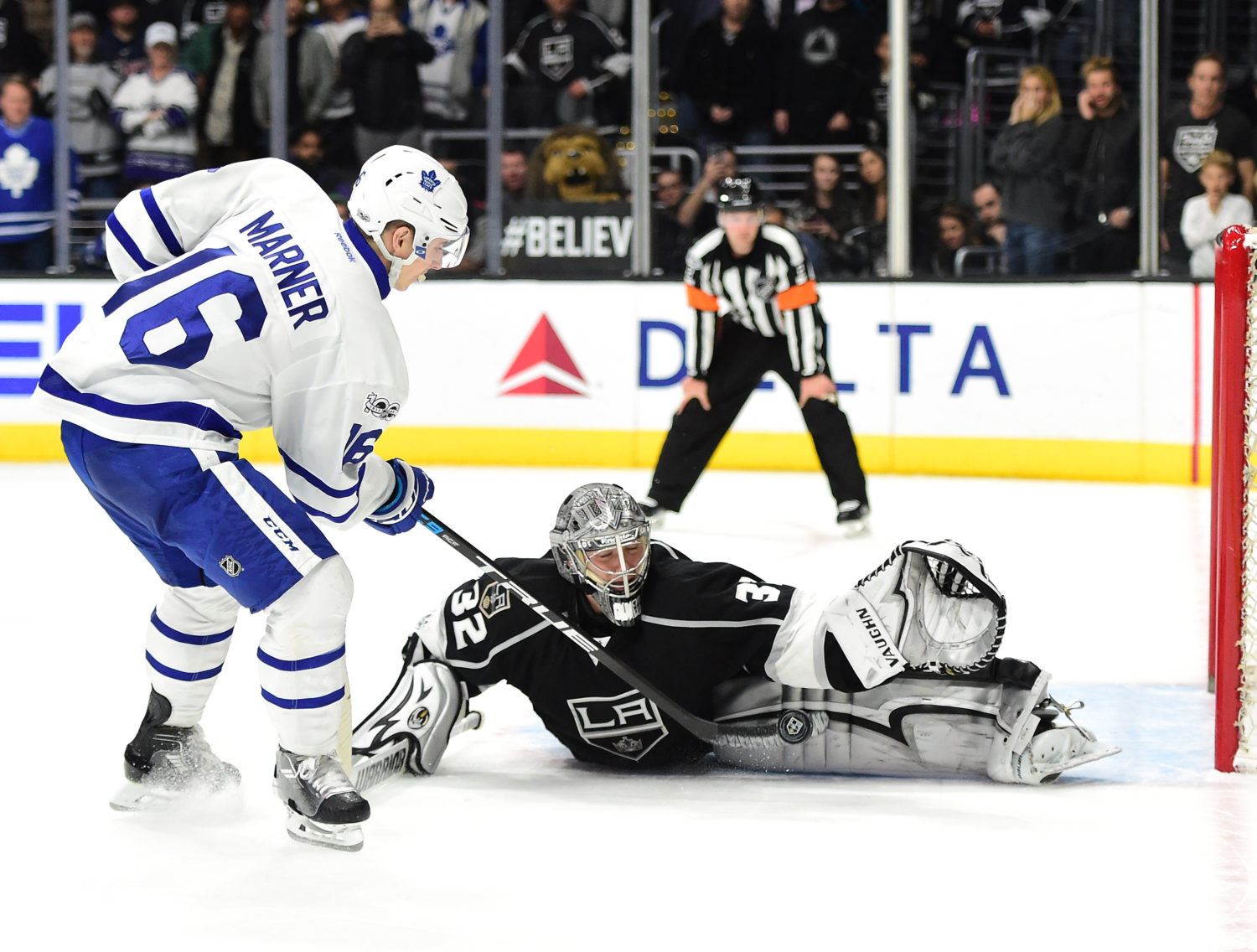
Harry How/Getty Images
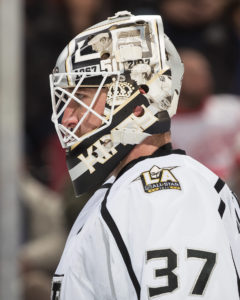
Dave Reginek/NHLI
This season: 551 minutes, 2-7-1 record, 2.95 goals-against average, .879 save percentage, .870 even strength save percentage, 0 shutouts
The good: Zatkoff won an emotional game in returning to his native Detroit, winning 4-1 in December and conducting interviews from an ancillary locker room he dressed in during his Little Caesar’s minor hockey days. Good natured, thoughtful and well-liked by his teammates, Zatkoff entered the year familiar and comfortable with many former Manchester teammates and was coming off a Stanley Cup with Pittsburgh.
The bad: The game in Detroit was Zatkoff’s only start that resulted in a win. The rest of his appearances, other than a relief win at Arizona, were largely very poor. Even though there wasn’t an excess of soft goals, there were still a lot of goals against. Zatkoff’s .870 even strength save percentage tied Dan Cloutier’s 2006-07 mark for the lowest single season ESSv% out of any L.A. goalie since 1997-98 who appeared in at least 10 games. Six of his eight starts resulted in at least three goals against. He also suffered a groin injury at an October morning skate, rendering him unavailable that night, and one month later during a narrow November loss at Ottawa, a game he was unable to continue. From then on, he never fully regain Darryl Sutter’s trust. “I think Jeff struggled right away when that knowledge of ‘I’ve got to play a bigger role’ [arose], and he was coming off a Stanley Cup, so I don’t think he had a great summer in terms of getting ready for the next season, so I think he struggled early and Peter took advantage of it,” Sutter said in January. After being assigned to the Reign, Zatkoff was named the starter for the decisive Game 5 in San Diego during Ontario’s first round playoff series but suffered an injury in warm-ups and did not play in the series-ending 4-1 loss
Going forward: Zatkoff remains under contract for one more season but will not be in the team’s NHL plans. Jonathan Quick and the winner of the Darcy Kuemper/Jack Campbell competition (penciled in as Kuemper for now) will start the year in Los Angeles, while either Kuemper or Campbell will split the heavy majority of Ontario’s minutes with Cal Petersen. As of mid-August it is not clear where Zatkoff fits in for 2017-18.
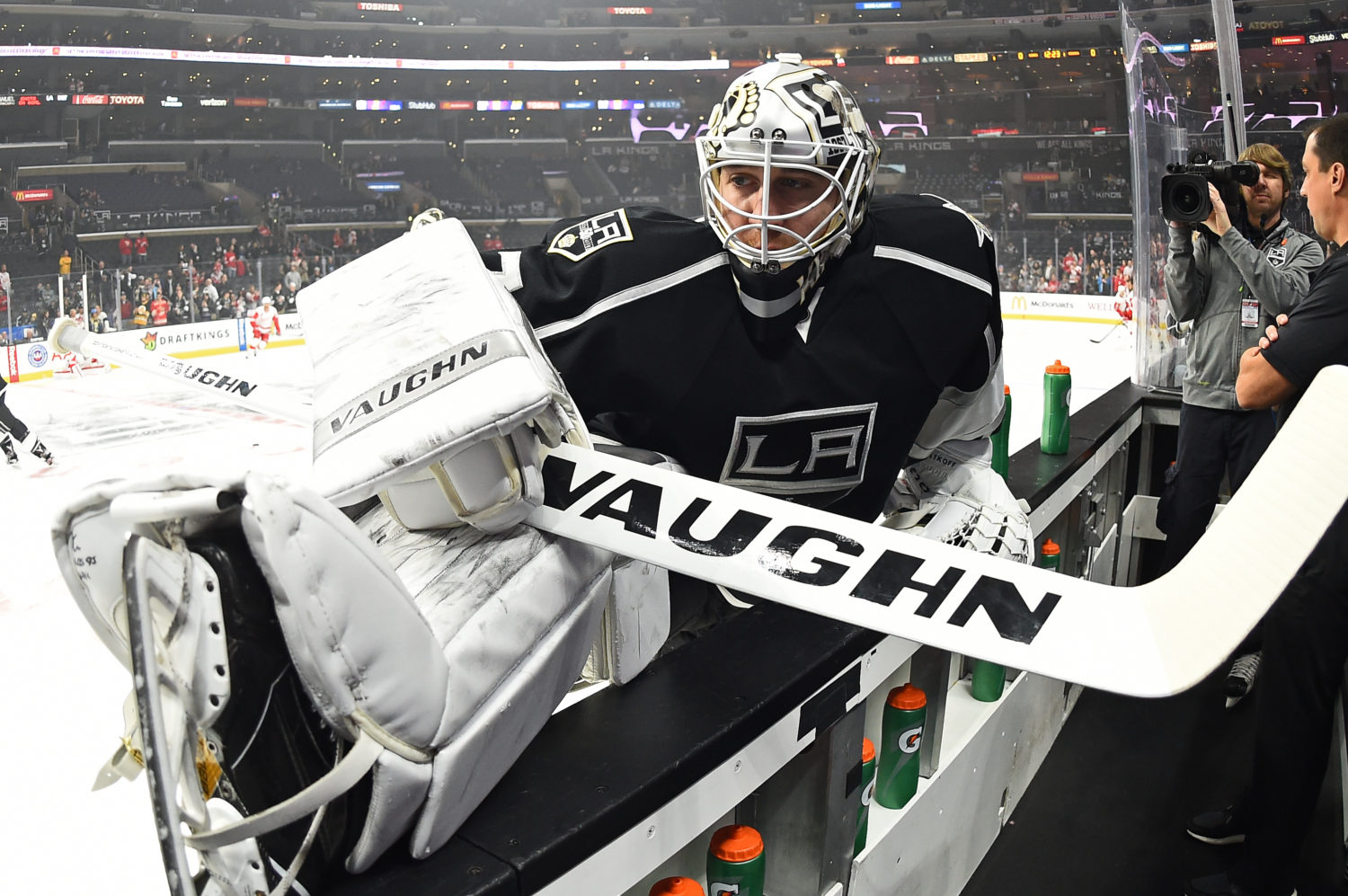
Andrew D. Bernstein/NHLI
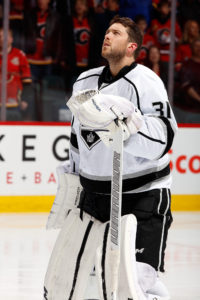
Gerry Thomas/NHLI
This season: 411 minutes, 2-3-2 record, 2.49 goals-against average, .900 save percentage, .895 even strength save percentage, 0 shutouts (with Los Angeles), 2,223 minutes, 18-15-5 record, 2.54 goals-against average, .910 save percentage, .917 even strength save percentage, 1 shutout
The good: The Kings weren’t able to complete a trade to provide scoring alongside Anze Kopitar at the deadline and instead swung an unexpected deal for another number one goalie that would gradually allow Jonathan Quick to work back into the lineup following his return from injury during a late-season, condensed portion of the playoff hunt. Of his seven games, he turned in two excellent performances (1-2 OTL @ CGY, 2/28; 4-1 W @ CGY, 3/29) two could-be-better performances (3-4 L vs VAN, 3/4; 1-4 L vs CGY, 4/6), and was otherwise fine in his remaining 171 minutes. Well-liked and highly respected, the classy Bishop left an impression on his teammates, colleagues and media that went beyond his small Los Angeles sample size.
The bad: Bishop ultimately did not make much of an impact on the ice, and his numbers, amidst a small sample size, were worse than those of Budaj, the goalie who was part of the package to acquire him. Considering he joined the team right when the bottom dropped out on the group, seven weeks before the organization made major changes, he gets a bit of a pass here. These were not ideal circumstances to get the most out of the talented (and massive) goalie. He’s a huge Cardinals fan.
Going forward: As part of the package to acquire Bishop, the Kings traded Erik Cernak, a raw but interesting former second round pick who required a little bit of extra maintenance than your typical draft pick. They also received a fifth round draft pick, which was used to select forward Drake Rymsha, and after trading Bishop’s rights to Dallas, a fourth round pick that was used to select Markus Phillips. As of now this trade hasn’t paid any real dividends for Los Angeles, but if either Phillips or Rymsha surpasses the value of Cernak, that obviously changes. Bishop signed a six-year, $29.5-million contract with the Stars and will look to provide stability in the crease of a team that has yielded scoring chances at a much greater quantity and of higher quality than the Kings this decade.
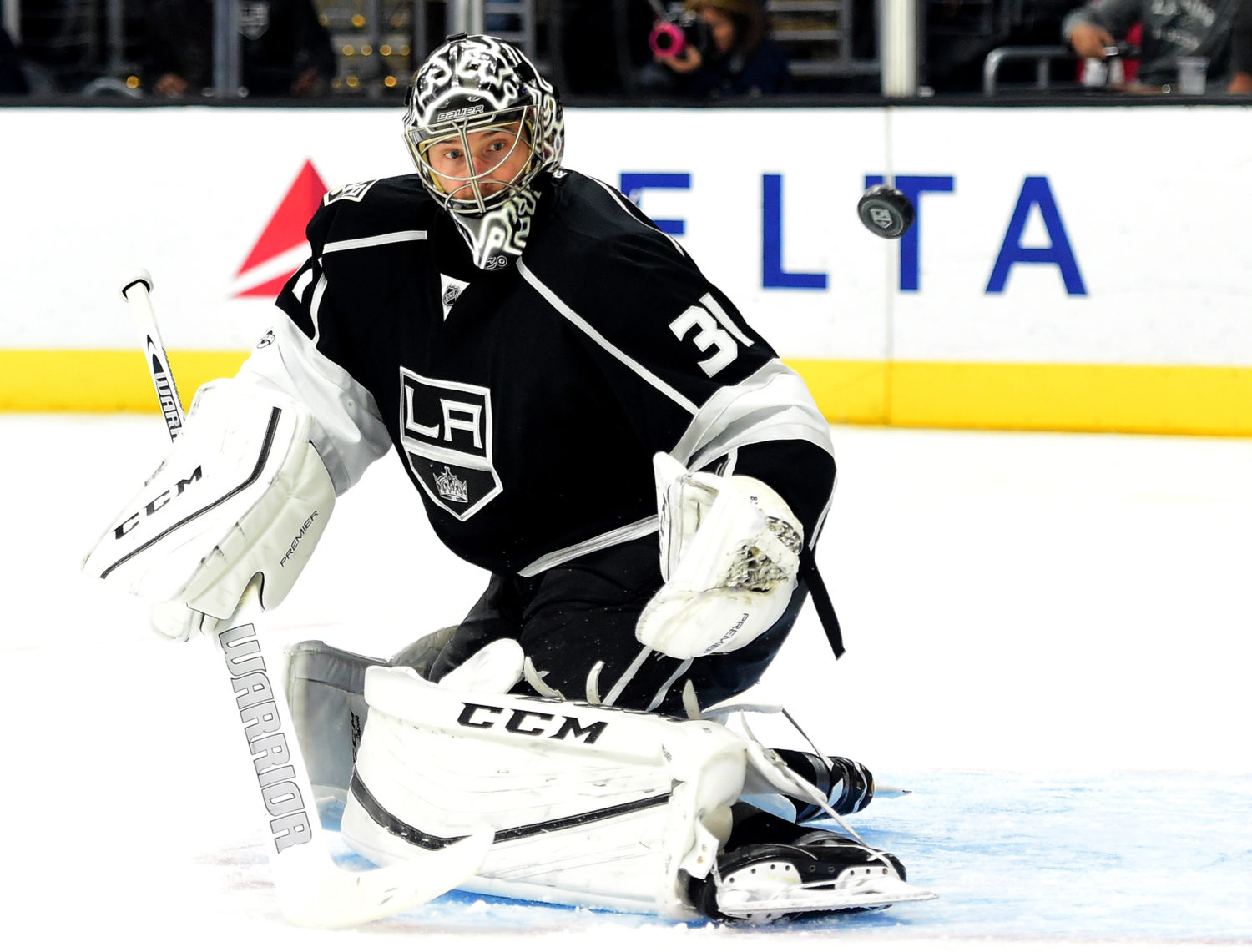
Harry How/Getty Images

Aaron Poole/NHLI
This season: 20 minutes, 0-0-0 record, 0.00 goals-against average, 1.000 save percentage, 0 shutouts
The good: It was only 20 minutes of a game the Kings were losing 4-0, but when former first round pick Jack Campbell returned to an NHL crease on November 1 for the first time in three seasons, it was a special and emotional moment for a player who worked hard to get his career back on track. “It felt good to get in there,” he said after the game. “It’s been a while for me since my last game, and the team played great in front of me, so that was a good sign.” He was a horse for Ontario, finishing second in the AHL with 3,072 minutes played, tied for second with five shutouts, and led the league with 31 wins. It was hard to root against the positive and cheery Campbell. “He’s polite. He’s friendly. He’s engaging. He likes to talk. He’s well brought up. He’s just a good person,” Reign coach Mike Stothers said. “It’s hard not to like him. It’s hard not to root for him. And maybe that makes him different than some of the other goalies that you can’t talk to them the day of the game or you can’t touch their equipment, it’s like holy smokes, they got a million things, right? Soupy doesn’t seem, or at least he doesn’t let on, like if somebody was to brush against his pads laying on the floor before a game he doesn’t think, ‘oh no, now I’m going to have a bad night.’ He’s just kind of like, whatever, he just deals with it. So, he’s a good kid. He’s just a good person.” Campbell emerged as a terrific story and a mid-season AHL All-Star after having pressed the proverbial Reset Button following Jonathan Quick’s injury and the recall of Peter Budaj that opened up a ton of minutes in the Reign’s crease.
The bad: Nothing that affected the Kings, but a player who turned 25 midway through the season posting a 2.52 goals-against average and a .914 save percentage doesn’t exactly foretell a decade of high-level NHL success. That’s a bit harsh, though; Campbell was among those who maximized his skill set, held down a starting role when other options were scarce, and emerged as one of the organization’s better stories of the past year.
Going forward: Campbell will compete with Darcy Kuemper for the team’s back-up position, a role that Kuemper, by virtue of his 102 career NHL games, will have the inside track to win. Expect him to receive ample opportunity during the preseason as he vies for his first full-time NHL role. “The day I was drafted to the Dallas Stars I always told myself I’m going to play 20 years with the Dallas Stars as the franchise goalie. That’s just what I had in my head. It started in Windsor. I struggled in Windsor, then I had a pretty solid rookie year in Texas playing 40 games, my second year I was lights out I was just hurt, my third and fourth year it was really a mental grind and that’s when it all went down,” Campbell told Reign Insider Lindsay Czarnecki. “Then the day I got traded here, [goalie coach] Dusty [Imoo] and I talked and just let it all go. It didn’t happen overnight, but we were able to just put it behind me and right now I really don’t feel like I was really a part of anything other than L.A. It’s a really cool feeling. I could lie about it and say I’ve moved on and if I hadn’t it wouldn’t benefit but it’s cool to be able to look myself in the mirror and be OK with my past and just be like, well, I just love where I’m at now and I love where things are going and I can keep getting better here and that’s what I love about it is I have a lot of people here to help me get better and it’s just a really great spot.” Should the Kings ultimately decide to assign Campbell to Ontario, he would have to pass through waivers. Nick Ebert, the player swapped for Campbell at the 2016 NHL Draft, recently signed a contract with KHL-Bratislava without appearing in an NHL game, so any yield the team receives from Soupy is continued added value.
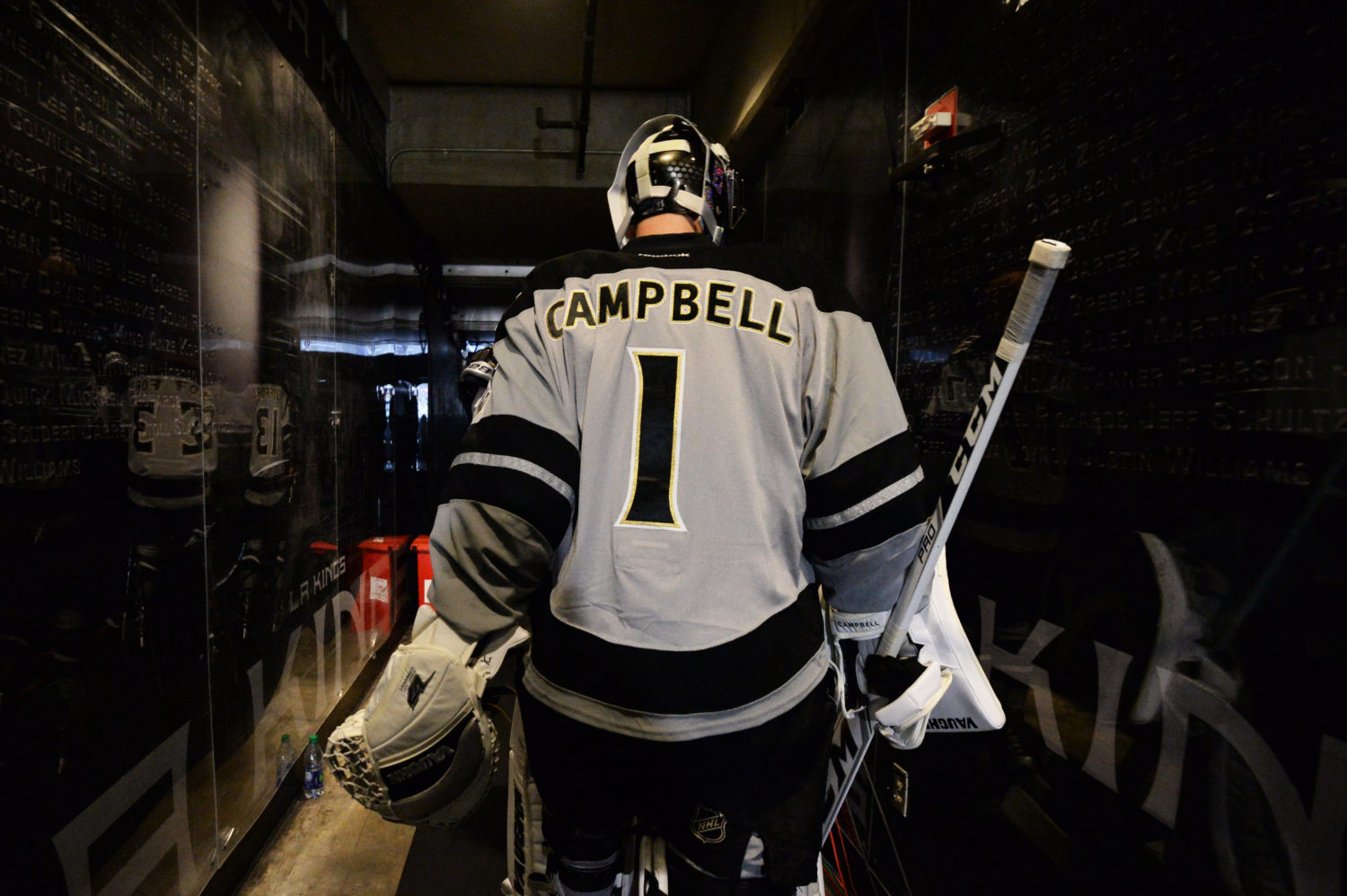
Aaron Poole/NHLI

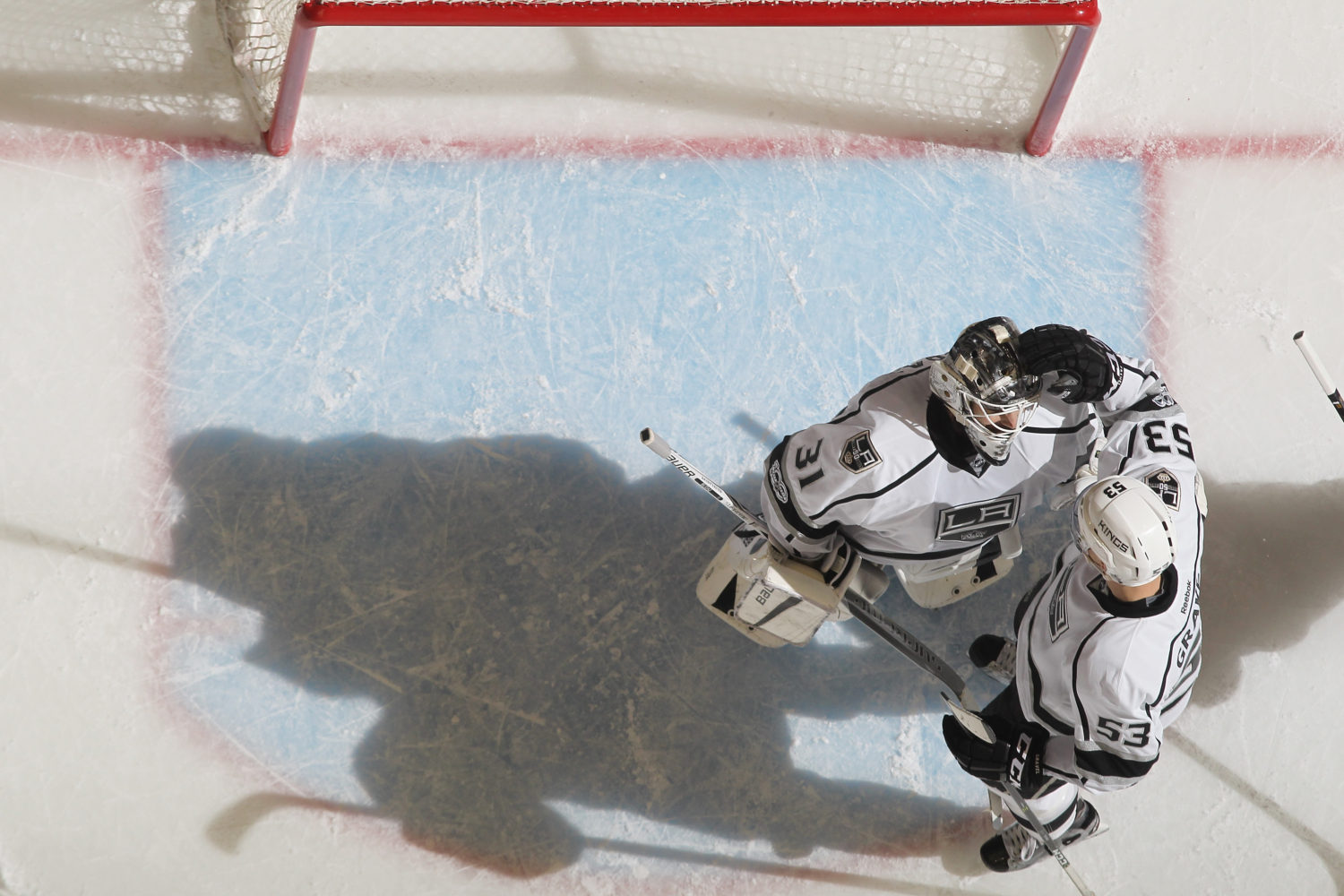
Rules for Blog Commenting
Repeated violations of the blog rules will result in site bans, commensurate with the nature and number of offenses.
Please flag any comments that violate the site rules for moderation. For immediate problems regarding problematic posts, please email zdooley@lakings.com.